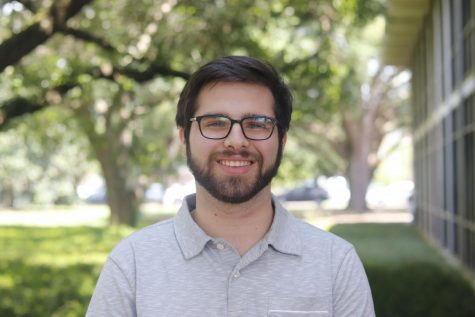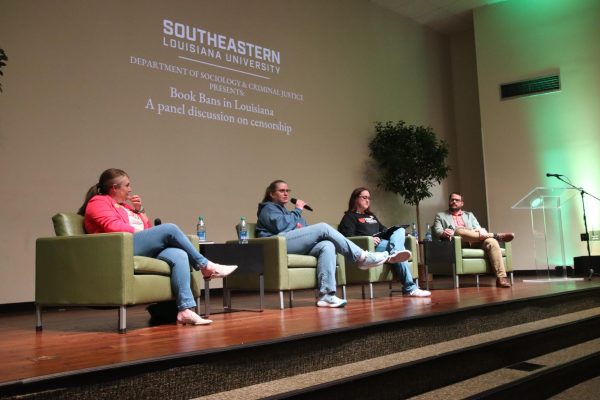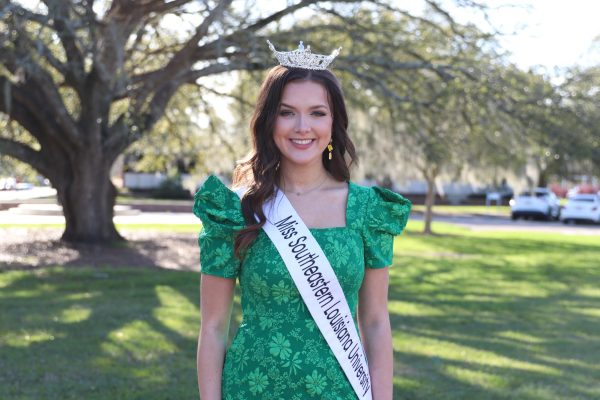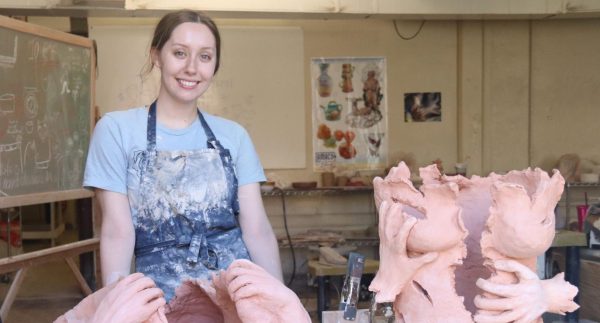English professor connects gaming to publishing studies
Gerard Borne/The Lion’s Roar
With advancements in digital technology, university professor Samuel Fuller is teaching his students to engage in unconventional digital mediums. ENGL 494/594 focus on the rhetoric of game design as a communication medium.
Most students may play video games as a hobby, but for one English class, video games are part of the curriculum.
Samuel Fuller, an assistant English professor, teaches ENGL 494/594: Publishing in Digital Humanities, which explores how the humanities are changing in response to evolving digital technology. As part of the class, students are instructed to use unconventional methods of communication, such as playing and modifying video games.
Fuller has also previously taught ENGL 315: Writing and Video Games, which focused on the stories that video games contain.
Fuller explained how the humanities have changed in response to these new technologies and why he feels it is important to engage with these mediums.
“One of the big changes is that humanities scholars these days can’t just write traditional, academic essays and expect lots of people outside of their field to engage with their ideas—instead, they need to consider communicating through new and popular media forms like websites, music, video and video games,” said Fuller. “This is something we discuss in terms of ‘publishing’—how can/should humanities scholars publish in these forms?”
According to Fuller, video games are a particularly challenging medium for scholars to engage with.
“When it comes to video games, scholars can either learn how to design their own games, which can be quite difficult, or they can modify, aka ‘mod’, existing games,” shared Foster. “My research focuses on the latter.”
Fuller’s doctoral dissertation was written on modding in video games as a form of self-expression.
“It’s especially interesting to me when people mod games to include stories that explore aspects of the human condition that are frequently ignored, or deliberately excluded, by the video game industry—political views, identities, relationships, etc,” said Fuller. “My research led me to explore the entire history of video games, and a wide range of scholarly writings about video games, so ‘video games’ sort of became my academic specialty. As a professor at Southeastern, I tend to bring up video games in my classes whenever I can.”
The class focuses on game studies, which is a humanities discipline that is more about the rhetoric of game design. Fuller detailed what the study entails.
“Game studies is much like film studies or literature studies,” explained Fuller. “They draw upon theoretical frameworks based on studies in the humanities, including those related to culture, race, class, gender, language and aesthetics. Students in publishing studies benefit from understanding more than just the ‘business’ or ‘industry’ side of publishing. They should consider how what is being published affects humanity as a whole.”
Fuller brings video games into publishing studies because he feels they are useful for demonstrating that different media forms go through different publishing processes.
“It’s interesting to discuss the differences between the video game industry and the book industry, film industry, comic industry, music industry, even the live streaming industry,” said Fuller. “You name it: If it involves ideas being made available to the public, it’s relevant to publishing studies.”
From his experiences with teaching, Fuller noted that some students feel very passionately about video games.
“They have strong opinions about what makes ‘good’ games, and I like discussing those opinions,” shared Fuller. “When I was an English undergrad, I didn’t get many opportunities to talk about the games I liked. We spent lots of time discussing and interpreting stories in literature, like The Faerie Queene, but never the epic tale of Final Fantasy VII. So, I think space needs to be made for discussions of video games in English classes. It’s an important and influential medium.”
Your donation will support The Lion's Roar student journalists at Southeastern Louisiana University.
In addition, your contribution will allow us to cover our annual website hosting costs.
No gift is too small.

Dylan Meche is a Political Science major from Baton Rouge and serves as Opinions Editor. He has been a reporter for The Lion's Roar since August of 2019....





